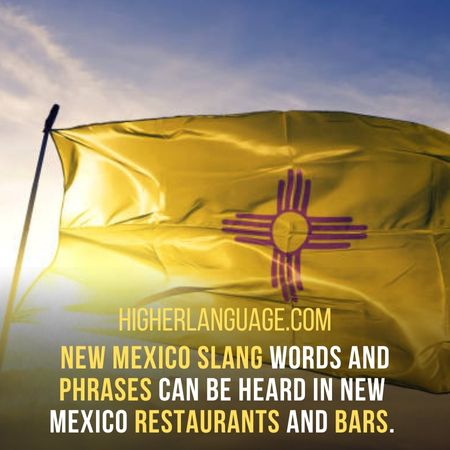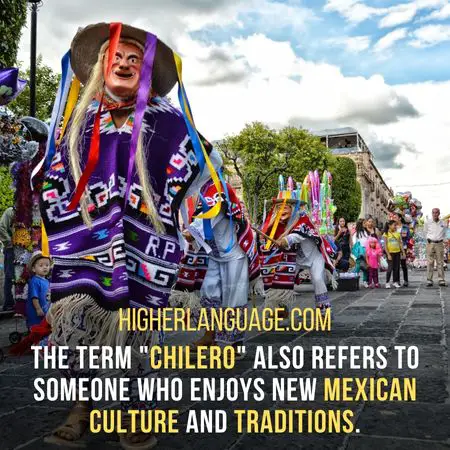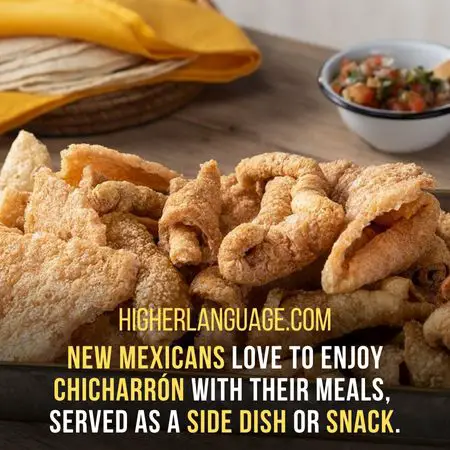New Mexican slang words and phrases are informal or regional expressions that New Mexicans use in everyday speech.
These words and phrases have meanings that may be different from the standard English definitions. For example, New Mexico slang can include both funny terms and colorful insults.
New Mexico Slang Words And Phrases
New Mexico has a rich and varied history, so it’s no surprise that New Mexico slang has been influenced by Spanish, Native American, Mexican, and Anglo cultures.
New Mexico’s unique brand of humor is based on regional dialects, often used to express regional pride.

New Mexico slang words and phrases can often be heard in New Mexico restaurants, bars, and even in everyday conversation.
While some of these words have been around for centuries, others are recent inventions.
It’s important to note that while New Mexico slang often brings a smile to the face of locals, it could also lead to confusion if used in the wrong context.
So whether you’re a New Mexican visiting another state or a New Mexico newcomer, it helps to know some common New Mexico slang words and phrases.
Here are some examples of New Mexico slang words and phrases you should know:
25 Famous New Mexico Slang Words And Phrases
Slang is an informal language that people in a particular place use. New Mexico slang words and phrases can be confusing, but they’re part of the culture.
New Mexico is a unique place with its own culture, language, and history. New Mexicans have their own lingo that can be confusing to outsiders.
You may want to learn some of New Mexico’s slang words and phrases to fit in. So, here are some famous New Mexico slang words and phrases:
1. Cabrón:
New Mexicans use the term “cabrón” to refer to a person who is acting stubbornly or difficult.
For example, one New Mexican might say, “Ese cabrón es muy testarudo,” which translates to “That guy is really stubborn.”
The term can also be used as an endearing nickname for a friend.
2. Carnal:
New Mexicans use the term “carnal” to mean friend or close comrade. So, for example, two New Mexicans might say, “Es mi carnal,” which means, “He’s my friend.”
It is also used as a term for endearment between family members. It originated from the Spanish word “Hermano,” which means brother.
3. Chingar:
New Mexicans use the term “chingar” to mean many different things depending on its context.
It can be used to express disbelief, surprise, or admiration. For example, one New Mexican might say, “¡Chingar!” which means “No way!”

It can also be used to describe something that is unpleasant or that has gone wrong.
For example, one New Mexican might say, “Está chingado mi carro,” which means, “My car is messed up.”
4. Atrás:
New Mexicans use the phrase “atrás!” to mean “back off” or “leave me alone.”
So, for example, if someone is bothering you, you might say, “Ata atrás!” which means “Back off!”
The term is also used as an exclamation of surprise or disbelief. For example, one New Mexican might say, “¡Atrás!” which means “No way!”
5. Chido:
The term “Chido” is widely used in New Mexico to describe something cool or awesome.
For example, one New Mexican might say, “Esa bicicleta está chida,” which means, “That bike is cool.”
The term can also be used to show agreement or approval. For example, one New Mexican might say “¡Chido!” which means “Cool!”
6. Pendejada:
If you hear New Mexicans using the word “pendejada,” they are likely referring to something ridiculous or silly.
The term is derived from the Spanish word for “foolish person” and can be used as an insult or to express annoyance at something.
For example, one New Mexican might say, “¡Qué pendejada!” which means “What a ridiculous thing!”
7. Chuleta:
The term “chuleta” is used to describe something or someone annoying or irritating.
For example, one New Mexican might say, “No me moleste la chuleta” which means, “Don’t bother me, you annoying person!”
The term is derived from the Spanish word for “pork chop” and refers to someone overly annoying or irritating.
8. Chilero:
In New Mexico, the term “chilero” is used to refer to someone who loves spicy food.
People who refer to themselves as a “chilero” proudly declare their love for spicy New Mexican cuisine.

The term also refers to someone who enjoys New Mexican culture and traditions.
9. Carne Adovada:
This New Mexico slang term refers to the popular New Mexican dish of pork simmered in red chili sauce.
The dish is traditionally served with rice and beans, and it is considered by many to be the state’s official dish.
10. Vato:
New Mexicans use the term “vato” to mean a guy or a friend. It can also be used as an endearing term for someone you are close with like you would say, “my dude.”
For example, “What’s up, vato?” This term is often used among New Mexicans.
11. Chile:
When New Mexicans talk about chile, they usually refer to New Mexican green and red chiles that grow in the state.
These chiles are commonly used to make dishes such as enchiladas, tamales, and burritos and are even just eaten straight off the vine.
New Mexicans are very proud of their chile, a key ingredient in New Mexican cuisine.
12. Chicharrón:
This is another type of food New Mexicans love. Chicharrón is a dish made from deep-fried pork rinds that are often tossed with spices like chili powder or cumin.

New Mexicans love to enjoy chicharrón with their meals, served as a side dish or snack.
13. Ya ya:
This phrase is often used to express excitement or agreement among New Mexicans. However, it’s an informal way of expressing enthusiasm and can be used in any situation.
For example, “Ya ya, let’s go!” The term is also used to ask for confirmation or agreement, so New Mexicans often say “Ya ya?” before asking a question.
14. Shooby Dooby:
This phrase is generally used to express surprise or shock. For example, new Mexicans might exclaim, “shooby dooby!” when something unexpected happens.
For example, if someone sees a celebrity walking down the street, they might shout, “shooby dooby!” It’s also used to express confusion or disbelief.
It’s a phrase that New Mexicans use casually in everyday conversation, and it’s often used humorously to express disbelief.
15. Puro New Mexico:
This phrase is used by New Mexicans to describe something that’s uniquely from New Mexico or has a distinctly New Mexican flavor.

It essentially means “all New Mexico” and refers to New Mexican cuisine, culture, or people.
16. Ese/Esé:
This is a very common New Mexican phrase used to refer to a friend. It’s similar to the English term “dude.”
It can be used to express affection for someone or simply as a friendly greeting.
For example, you might hear someone say, “What’s up, ese?” The term esé is also used to refer to oneself.
17. Gringo:
This New Mexico slang phrase is used to refer to a non-native New Mexican or someone who isn’t from New Mexico.
For example, someone from New York or California might be referred to as a gringo when visiting New Mexico.
It’s often used lightheartedly, usually as a term of endearment.
18. Tronar:
This New Mexico slang word is the New Mexican version of “to blow up” or “to explode”. It can describe something that has gone wrong or a situation out of control.
For example, someone might say, “¡Tronar! Mi computadora se esta rompiendo.” (Explode! My computer is breaking down.)
19. Duende:
This New Mexican slang term is used to describe something that is strange or mysterious. It can also be used to refer to a playful spirit or mischievous elf.
For example, someone might say, “¡El duende vino a visitarme esta noche!” (The mischievous elf came to visit me last night!)
The term also describes a feeling or experience that cannot be explained.
20. Tío:
Tío is New Mexican slang for cool, awesome, or amazing. It’s often used when something has exceeded expectations.

For example, someone might say “¡Esa película fue muy tío!” (That movie was really cool!) In addition, the term is often used to express excitement or enthusiasm.
21. Chaval:
This New Mexican slang word literally translates to “kid,” but its meaning is much more than that. It refers to a young person who is mischievous or rebellious.
Someone might say, “Es un chaval muy travieso” (He’s a very mischievous kid). The term can also be used to describe someone annoying or irritating.
22. Chamaco:
This New Mexico slang term is often used to refer to young boys and men.
It’s a commonly used term for endearment between friends, but it can also be used as an insult if someone is acting out or misbehaving.
For example, if you’re acting up and your friend says, “Chamaco!” they imply that you behave like a young boy.
23. Güey:
This New Mexico slang word is an insult and an endearing term. Depending on the context, it can mean either “dude” or “jerk.”
When used as an insult, it is often followed by another New Mexico slang term—chale—meaning “man, come on.”
The term is derived from the Spanish word “guey,” which is used in Mexico and other Spanish-speaking countries to refer to a person who engages in foolish behavior.
24. Rasquache:
This New Mexican slang term is used to describe someone who is resourceful and creative, despite having limited means.
For example, someone might say, “Es muy rasquache” (He’s very resourceful). The term is also used to describe something that is of low quality but still functional.
25. Pisto:
This New Mexican slang word is used to describe money or wealth. For example, someone might say, “Tengo mucho pisto para comprar eso” (I have a lot of money to buy that).

The term can also be used to refer to a person’s salary, such as “Mi pisto no me alcanza para pagar todas mis cuentas” (My salary doesn’t cover all my bills).
Final Thoughts:
New Mexico has its own unique set of slang words and phrases, which can be heard all over New Mexico.
Whether you’re a New Mexican visiting or a New Mexico newcomer, it helps to familiarize yourself with New Mexico’s local language so that conversations are understood.
Knowing some New Mexico slang words and phrases can help you make a great impression and fit right in.
New Mexico is amazing, so come over and get your New Mexico slang down!
- Explore Some Commonly Used Slang Words For Knives - November 6, 2023
- Here Are Some Of The Slang Words For Jeep Commonly Used - November 3, 2023
- Did You Know The Commonly Used Slang Words For King? - November 3, 2023
